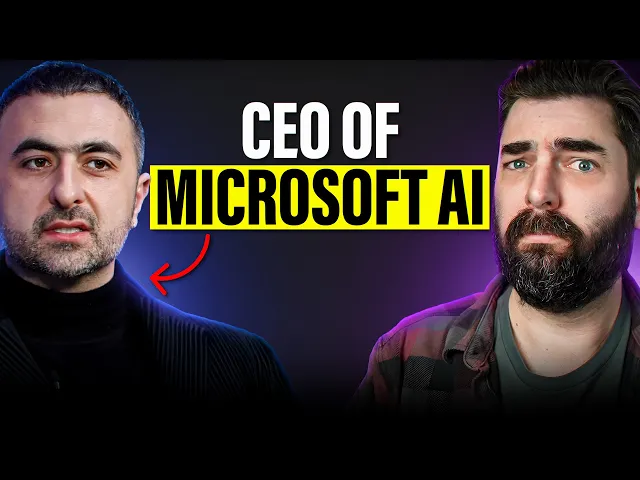Mustafa Suleyman: How AI Will Transform Work

AI's future in the workplace isn't what you expect
In a thoughtful conversation with Microsoft AI's CEO Mustafa Suleyman, the perspective on artificial intelligence, its capabilities, and its impact on our professional lives reveals a more nuanced reality than sensationalist headlines suggest. Suleyman, with his impressive background as DeepMind co-founder and author of "The Coming Wave," offers insights that cut through the noise around AI advancement and its workplace implications.
Key insights from Suleyman's perspective:
-
AI development isn't hitting a wall — Despite previous concerns about running out of training data or computational limits, the industry consistently finds new approaches: synthetic data generation, AI-to-AI feedback systems, and more efficient training methods that allow models to achieve the same capabilities with 100x less processing power.
-
"Hallucinations" represent both strength and evolution — What we label as hallucinations is partially the system's ability to interpolate between known data points, creating adaptive, fuzzy connections that traditional databases can't achieve. As models grow, they're becoming more controllable and reliable rather than more chaotic.
-
The work transformation is inevitable but not apocalyptic — While AI will fundamentally change how we work, Suleyman frames this as a transformation similar to previous technological revolutions, creating new opportunities as it eliminates outdated processes.
The most powerful insight: AI as a meta-capability amplifier
The most profound takeaway from the interview is Suleyman's perspective on tool use as a meta-capability. He suggests that even if foundation model development stopped today, we already have systems with the revolutionary ability to use tools, talk to other AIs, orchestrate sequences, and source factual knowledge. This creates a "technological overhang" where existing capabilities, when properly connected, will drive transformation regardless of future breakthroughs.
This matters because it shifts the AI conversation from theoretical future capabilities to practical present applications. While many debates center around speculative timelines to AGI or superintelligence, Suleyman's focus on measurable capabilities offers a pragmatic lens for understanding AI's impact today. The immediate transformation won't come from sci-fi scenarios but from AI's ability to amplify human capabilities through existing tools.
Where Suleyman's perspective falls short
While
Recent Videos
How To Earn MONEY With Images (No Bullsh*t)
Smart earnings from your image collection In today's digital economy, passive income streams have become increasingly accessible to creators with various skill sets. A recent YouTube video cuts through the hype to explore legitimate ways photographers, designers, and even casual smartphone users can monetize their image collections. The strategies outlined don't rely on unrealistic promises or complicated schemes—instead, they focus on established marketplaces with proven revenue potential for image creators. Key Points Stock photography platforms like Shutterstock, Adobe Stock, and Getty Images remain viable income sources when you understand their specific requirements and optimize your submissions accordingly. Specialized marketplaces focusing...
Oct 3, 2025New SHAPE SHIFTING AI Robot Is Freaking People Out
Liquid robots will change everything In the quiet labs of Carnegie Mellon University, scientists have created something that feels plucked from science fiction—a magnetic slime robot that can transform between liquid and solid states, slipping through tight spaces before reassembling on the other side. This technology, showcased in a recent YouTube video, represents a significant leap beyond traditional robotics into a realm where machines mimic not just animal movements, but their fundamental physical properties. While the internet might be buzzing with dystopian concerns about "shape-shifting terminators," the reality offers far more promising applications that could revolutionize medicine, rescue operations, and...
Oct 3, 2025How To Do Homeless AI Tiktok Trend (Tiktok Homeless AI Tutorial)
AI homeless trend raises ethical concerns In an era where social media trends evolve faster than we can comprehend them, TikTok's "homeless AI" trend has sparked both creative engagement and serious ethical questions. The trend, which involves using AI to transform ordinary photos into images depicting homelessness, has rapidly gained traction across the platform, with creators eagerly jumping on board to showcase their digital transformations. While the technical process is relatively straightforward, the implications of digitally "becoming homeless" for entertainment deserve careful consideration. The video tutorial provides a step-by-step guide on creating these AI-generated images, explaining how users can transform...
